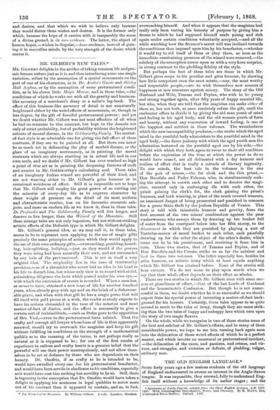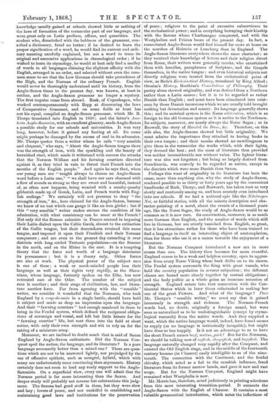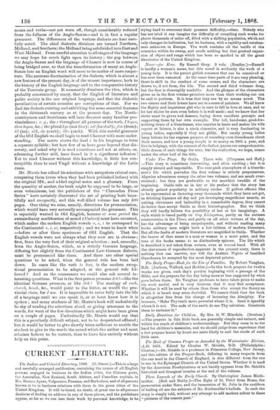THE OLD ENGLISH LANGUAGE.* SOME forty years ago a few
zealous students of the old language of England endeavoured to arouse an interest in the Anglo-Saxon tongue. It was impossible, they avowed, fully to understand Eng- lish itself without a knowledge of its earlier stages ; and the
• Specimens of Early Eng'ish, 'elected from the Chief Englid, Authors, A.D. 1250- 1400. With Grammatical Introduction, Notes, and Glossary. By R. Morris, Esq. (Clarendon Press Series.) Oxford. 1367. knowledge usually gained at schools showed little or nothing of the laws of formation of the vernacular part of our language, and were great only on Latin prefixes, affixes, and quantities. The student who, dissatisfied with the baldness of the grammar, con- sulted a dictionary, fared no better ; if he desired to learn the proper signification of a word, he would find its current and ordi- nary meaning carefully explained, but not a word to trace its original and successive applications in chronological order ; if he wished to learn its etymology, he would at best only find a medley of words in all languages claiming the slightest affinity with the English, arranged in no order, and selected without even the com- mon sense to see that the Low German should take precedence of the High, and the Norman of the ordinary French. English would never be thoroughly understood until its history, from the Anglo-Saxon times to the present day, was known, at least in outline, and the Anglo-Saxon grammar no longer a mystery. The first impulse came from abroad. Rash, of Copenhagen, who worked contemporaneously with Bopp at discovering the laws of Comparative Grammar, and on some fields at least has not his equal, compiled an Anglo-Saxon grammar, which Mr. B. Thorpe translated into English in 1830 ; and the latter's Ana- lecta Anglo-Saxonica, with an excellent glossary, made Anglo-Saxon a possible study for our schools and universities. It was very long, however, before it gained any footing at all. Its cause might perhaps be damaged by the excess of zeal in its advocates. Mr. Thorpe quotes from a writer whom he calls " very sensible and eloquent," who says, "About the Anglo-Saxon tongue there was the strength of iron, with the sparkling and the beauty of burnished steel, which made it withstand with success the attacks that the Norman William and his fawning courtiers directed against it, as they tried in vain to thrust their French into the mouths of the English people." And again he says that, when our young men are " taught always to choose an Anglo-Saxon word before a Latin one," " we shall have our ears charmed with a flow of sounds as strong as they are sweet and beautiful, instead of, as often now happens, being wearied with a namby-pamby gibberish made up of Greek, Latin, and French words with Eng- lish endings." We certainly will not presume to deny the strength of iron," &c., here claimed for the Anglo-Saxon, because we know of no test which can gauge it like an iron girder ; but if this " very sensible " writer makes success the condition of his admiration, with what consistency can he sneer at the French ? Not only did the Roman colonists in France succeed in imposing their Latin dialect upon the Celtic Gauls, almost to the extinction of the Gallic tongue, but their descendants retained this same tongue, and imposed it upon their Frankish and their Norman conquerors ; and are even to the present day extending it over districts with long settled Teutonic populations—on the Somme in the north, and on the Rhine in the east. It is a tempting theory that the force and worth of a language determine its permanence ; but it is a theory only. Other forces are also at work. The physical power of the subject race is one of these ; a weak or meek-minded people lose their language as well as their rights very rapidly, as the Slavo- nians, whose language, formerly spoken on the Elbe, has now retreated east of the Oder. The number of the subject race is another ; and their stage of civilization, law, and litera- ture another force. Far from agreeing with the "sensible" writer, we consider it wonderful that the Normans, who took England by a coup-de-main in a single battle, should have held it subject and made so deep an impression upon the language. And their " fawning courtiers " had enough manhood in them to bring in the Feudal system, which defined the reciprocal obliga- tions of sovereign and vassal, and left but little leisure for the " fawning courtier" life, but sent them into the field at short notice, with only their own strength and wit to rely on for the raising of a miniature army.
Moreover, we are inclined to doubt much that is said of Saxon England by Anglo-Saxon enthusiasts. Did the Norman Con- quest spoil the nation, the language, and its literature ? Is a pure language necessarily better than a mixed one ? These are ques- tions which are not to be answered lightly, nor prejudged by the use of offensive epithets, such as mongrel, hybrid, which with many are unfortunately more convincing than arguments. History certainly does not seem to lend any ready support to the Anglo- Saxonists. On a superficial view, every one will admit that the Norman period is far more interesting than the Saxon. And deeper study will probably not reverse but substantiate this judg- ment. The Saxons had good stuff in them, but they were slow and lazy ; lovers of peace, and not unskilful in establishing and maintaining good laws and institutions for the preservation
of peace ; religions to the point of excessive subservience to the ecclesiastical power ; and in everything betraying their kinship with the Saxons whom Charlemagne conquered, and with the Westphalian and Frisian boors of the present day. In fact, a resuscitated Anglo-Saxon would find himself far more at home on the marshes of Holstein or Luneburg than in England. The Anglo-Saxon literature everywhere shows the same character ; as they received their knowledge of letters and their religion direct from Rome, their writers were generally monks, who entertained them with homilies, paraphrases of Scripture, and the Gospels themselves, in the native tongue ; and even historical subjects not directly religious were treated from the ecclesiastical point of view, as Bede's Ecclesiastical History, translated by King Alfred ; Orosius's History, Boethius's Consolations of Philosophy. Their poetry alone showed originality, and was derived from a Northern rather than a Latin source ; but it is to be regarded as rather Danish than English ; and must have been stimulated into exist- ence by those Danish incursions which we are usually told brought nothing but devastation and misery. Its language generally shows this ; and its metrical system is the Norse alliteration, which is as foreign to the old German system as it is native to the Northmen. Its subjects, moreover, are nearly always the Norse Sagas ; as in Beowulf, the story of Havelok the Dane, &c. Therefore, on this side also, the Anglo-Saxons showed but little originality. We must admire the importance they attached to having books in their own tongue ; and their monks showed no unwillingness to give them in the vernacular the works which, with their lights, they deemed the best ; and the mass of literature thus provided was neither inconsiderable nor without value. The lighter litera- ture was also not forgotten ; but being so largely derived from Scandinavia, was scarcely to be regarded as native, except in the districts which were more Danish than Saxon.
Perhaps this want of originality in its literature has been the cause, more than anything else, why the study of Anglo-Saxon, rendered possible to us thirty or forty years ago by the convenient handbooks of Rask, Thorpe, and Bosworth, has taken root so very slowly and cautiously among us, and been scarcely even introduced into our schools. If we had a national epic like the Nibelungen Not, or faithful stories, with all the minute description and cha- racter-painting of a novel, about the events of a thousand years ago, like the Norse Sagas, the study of Anglo-Saxon would be as common as it is now rare. Its construction, moreover, is so much more German than English, and the number of words which still live in German, but are utterly vanished from English, so great, that it has attractions rather for those who have been trained to find a language in itself an interesting object of contemplation, than for those who use it as a means towards the enjoyment of a literature.
But the Norman Conquest introduced a new era in more senses than one. The history then becomes far more eventful. England ceases to be a weak and helpless country, open to aggres- sion from every Norse Viking whose bark drifts on to its shores. The Feudal system surrounds the King with great vassals, who hold the country population in severer subjection ; the different classes are bound more closely together by mutual obligations ; and the body politic as a whole gains an immense accession of strength. England enters into that connection with the Con- tinental States which in later times culminated in making her one of the great Powers. And what of the language ? Pace Mr. Thorpe's " sensible writer," we must say that it gained immensely in strength and richness. The Norman-French words had, no doubt, originally a foreign sound, but were soon so naturalized as to be undistinguishable (except by etymo- logical research) from the native words. And they supplied a want, which the native language would, indeed, have found means to supply (as no language is intrinsically incapable), but might have done so less happily. Is it not an advantage to us to have the short French names beef, mutton, pork? But for the Normans, we should be talking now of oxile.sh, sheepsjlesh, and hogsfiesh. The language naturally changed very rapidly after the Conquest, and entered the Old English stage, and in the middle of the fourteenth century became (in Chaucer) easily intelligible to us of the nine- teenth. The connection with the Continent, and the feudal chivalry, which acted as a foil to the monkish influence, freed literature from its former narrow bonds, and gave it new and vast scope. But for the Norman Conquest, England might have remained what Westphalia is now.
Mr. Morris has, therefore, acted judiciously in printing selections from this most interesting transition-period. It connects the Anglo-Saxon with the English of Chaucer. It contains a most valuable grammatical introduction, which notes the inflections of
nouns and verbs—not yet worn off, though considerably reduced from the fullness of the Anglo-Saxon—and is in fact a regular grammar. The differences of the various dialects are here care- fully noted. The chief dialectic divisions are termed Northern, Midland, and Southern; the Midland being subdivided into East and West Midland. From careful attention to all stages of the language we may hope for much light upon its history ; the gap between the Anglo-Saxon and the language of Chaucer is now in course of being bridged over, so that the transformation of many an Anglo- Saxon into an English word will cease to be matter of mere conjec- ture. The accurate discrimination of the dialects, which is almost a new feature of the present day, is of the utmost importance, both to the history of the English language and to the comparative history of the Teutonic group. It summarily dismisses the idea, which is probably entertained by many, that the English of literature and polite society is the one original language, and that the dialectic peculiarities of certain counties are corruptions of that. For we find the dialects existing and exhibiting the same essential features in the thirteenth century as at the present day. The North- countryman and Scotchman will here discover many familiar pro- vincialisms; e. g., the s throughout all persons of the verb, I hopes, thou hopes, &c.; the plural kye (not kine); sal (for shall); fra (from); -ti/ (to) ; silk, sic (such) ; ilka (each). With this careful grammar of the Old English we shall begin to read Chaucer with more under- standing. The metre shows the final e in his language to form -a separate syllable ; but how few of us have gone beyond that dis- covery, and asked why it is used sometimes and not at others, or, advancing further still, have found in it a significant inflexion ! Yet to read Chaucer without this knowledge, is little less con- temptible than to read Virgil without a knowledge of the Latin cases.
Mr. Morris has edited his selections with scrupulous critical care, comparing them (even when they had been published before) with the original MS., and added capital notes and a glossary. From the quantity of matter, the book might be supposed to be large, or even voluminous, but the publishers of the Clarendon Press Series " have certainly discovered the art of printing both beau- tifully and compactly, and this well-filled volume has only 500 pages. One thing we miss, namely, directions for pronunciation, which would have very naturally accompanied the grammar. This is especially wanted in Old English, because at some period the extraordinary modification of sound (Umlaut) must have occurred, which makes the modern English vowels a, e, i to correspond to the Continental e, i, ei, respectively ; and we want to know when —before or after these specimens of Old English. That the English vowels were not always what they now are is obvious ; first, from the very fact of their original selection ; and, secondly, from the Anglo-Saxon, which, as a strictly German language, differing but slightly from the Continental Low-German dialects, mast be pronounced like them. And there are other special questions to be asked, when the general rule has been laid down. In cases like the verb to love, is the modern excep- tional pronunciation to be adopted, or the general rule fol- lowed ? And on the consonants we could also ask several in- teresting questions. What is the first person pronoun Ichi—like the identical German pronoun, or like itch ? The analogy of such, church, bench, &c., would point to the latter, as woad the pro- vincial cham, for / am. It is impossible to enter fully into the life of a language until we can speak it, or at least know how it is spoken ; and many students of Mr. Morris's book will undoubtedly be shy of reading the selections aloud, or giving utterance to the words, for want of the few directions which might have been given on a couple of pages. Undoubtedly Mr. Morris would say that this is a peculiarly difficult subject, not to be despatched offhand ; but it would be better to give shortly hints sufficient to enable the student to give to the words the sound which the author and most scholars believe to be correct, than to leave him entirely without help on this point.




































 Previous page
Previous page